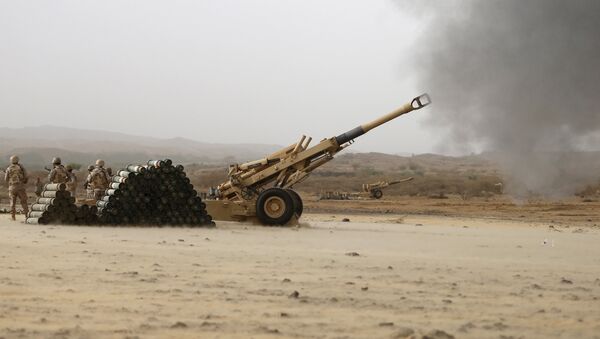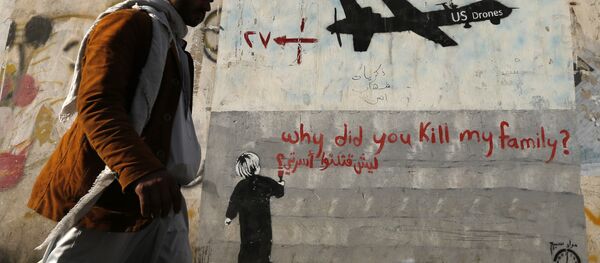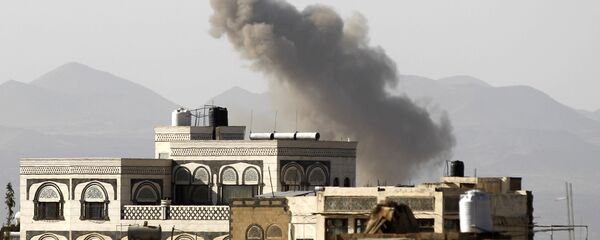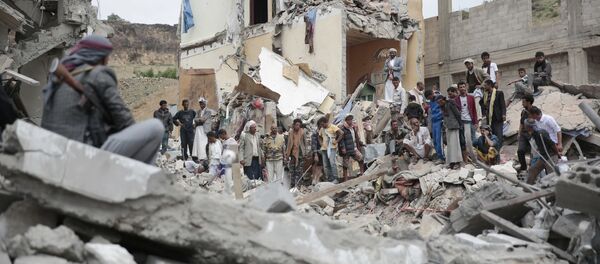Save the Children, a charity that supports the Kitaf rural hospital which was targeted, confirmed the attack Tuesday. According to a statement the charity released, a missile struck a gas station near the hospital's entrance, about 60 miles from the city of Saada, at around 9:30 a.m. local time.
"We are shocked and appalled by this outrageous attack," Carolyn Miles, head of Save the Children, said in the statement. "Innocent children and health workers have lost their lives in what appears to been an indiscriminate attack on a hospital in a densely populated civilian area."
According to Marandi, who joined Radio Sputnik's Loud & Clear Wednesday, attacks on Yemeni civilian targets by Saudi Arabia are frequent occurrences.
"I think much of it has to do with the Wahhabi ideology that has been taught at Saudi schools for many decades and the way in which Saudi society is brought up to despise and hate people who do not think like them. It is in their school books, and it's in their mosques. So, a lot of young people automatically think very poorly of people who don't have an almost identical ideology to them. As we all know, al-Qaeda and ISIS and other such [terrorist] groups, they are all influenced by the same Saudi ideology," Marandi told hosts John Kiriakou and Brian Becker.
Wahhabism is puritanical form of Sunni Islam that is practised in Saudi Arabia. Under the religious movement, those who don't practice the austere form of Islam are considered heathens.
"The second [element] is that Yemen has very few targets. There was very [little] infrastructure that [the Saudi-led coalition] could target from day one… there was nothing more to strike, and so [they] gradually went out to strike other targets using excuses to do so, and then after awhile, they stopped using excuses altogether. It's not completely unlike, of course, what the Americans [did] in Iraq and Afghanistan. The Americans struck civilian targets many times. Initially, the Americans would always say [they were striking] military targets, but after it would come out [that they had struck civilian targets], they would say it was some sort of mistake. In the case of the Saudis, since they are not even answerable to the very loyal mainstream media that the Americans sometimes have to be answerable to, they just carry out their attacks with impunity. They don't have any military targets to hit, so they go on hitting targets that they think will help them win the war."
Yemen, one of the Arab world's poorest countries, has been engulfed in a violent conflict between a government-in-exile headed by President Abdrabuh Mansour Hadi and the armed Shiite Houthi movement, also known as Ansar Allah, backed by army units loyal to former President Ali Abdullah Saleh, since March 25, 2015. The conflict intensified when a Saudi-led, US-backed coalition launched massive airstrikes against the Houthi political opposition faction in 2015.
Saudi coalition forces armed with US-made missiles and other weapons have killed thousands of Yemenis. On March 14, the United Nations' Office of the High Commissioner for Human Rights (OHCHR) verified the deaths of at least 7,072 civilians since March 2015 and the injury of at least 11,205. The actual death tolls are likely to be much higher, according to the UN. In November, the Associated Press reported that the armed conflict has killed at least 57,538 people, noting that this estimate is likely to increase to 70,000 or 80,000 once death tolls from the first nine months of 2015 are taken into account.
In addition, starvation and disease have further ravaged the war-torn country. Cholera, a deadly disease caused by the bacterium Vibrio cholera that results in diarrhea and dehydration, has rapidly spread during the war as a result of poor hygiene and sanitation, as well as a lack of access to clean water.
"Cholera is starting to spread like wildfire across the country. In the past three months, we've seen 200 deaths and more than 110,000 suspected cases," Lise Grande, the UN humanitarian coordinator for Yemen, recently said in a press release.
"All aggressors, or most aggressors throughout history, have always had some sort of justification in their minds for what they do. And the Americans, when they bombed Iraq, Afghanistan or Libya, or when they strike Syria, there is always a so-called good reason to do so. At the end of the day, it's either some sort of exceptionalism in the case of the US or Western countries where they are morally, or civilization-wise, more superior than the rest of the world, so they have ‘special privileges' and ‘rights.' Therefore, even when they carry out crimes, they are not crimes in their eyes; they're mistakes. And the same logic sort of works for countries or regimes like Saudi Arabia," Marandi added.
"And it's not just them [the Saudis and the Americans that carry out crimes]. It's the Canadians; it's the Canadian Prime Minister [Justin Trudeau], who likes to pretend he's a great human rights protector; it's the British government; it's the French. All of these countries are involved, and it's not just bombings. It's a siege [in Yemen] that we have seen for four years that has prevented people from obtaining food. They're tried to starve people into submission, and all of these countries aligned with Saudi Arabia have been part of it, and all the mainstream or state-owned Western media outlets are all involved in this," Marandi added.
"In the 1980s, when [then-President of Iraq] Saddam Hussein was gassing Iraqis, Iranians and Iraqi Kurds, Western countries were providing him with those weapons and the intelligence to use those weapons. There is no difference between the bomber who drops the bomb, Saddam Hussein, who gives the orders, or Western governments, who gave those weapons to Saddam Hussein," he added.







